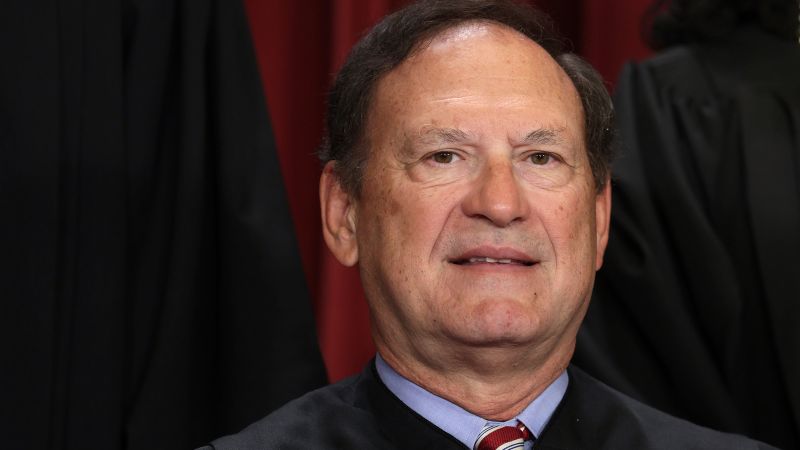The New York Times reported that an upside-down American flag, a symbol associated with some supporters of former President Donald Trump who challenged Joe Biden’s 2020 victory, was seen hanging outside the home of Supreme Court Justice Samuel Alito after the election. This revelation may lead to calls for Alito, a conservative justice, to recuse himself from high-profile cases related to the election and the Capitol attack, including a key case involving Trump’s potential immunity from federal election subversion charges.
The Times published a photo of the inverted flag at Alito’s home in Virginia on January 17, 2021. The Supreme Court spokeswoman did not respond to requests for comment, and CNN has not independently verified the use of the flag. Alito denied any involvement in hanging the flag, stating that his wife briefly placed it in response to a neighbor’s use of offensive language on yard signs.
The presence of the upside-down flag at Alito’s home raises concerns about his impartiality in cases related to the election and the Capitol attack. Critics may argue that the use of this symbol by Trump supporters could suggest bias or influence on Alito’s decision-making process. The controversy surrounding the symbol may impact public perception of the Supreme Court’s ability to handle politically sensitive cases fairly.
Alito’s statement that he had no involvement in hanging the flag may not fully address concerns about his impartiality. The explanation that the flag was a response to a neighbor’s offensive language raises questions about the appropriateness of using such a symbol in that context. As a member of the Supreme Court’s conservative wing, Alito’s actions and statements regarding the flag may have broader implications for the court’s credibility and public trust in its decisions.
The debate over the upside-down flag at Justice Alito’s home highlights the challenges of separating personal beliefs and actions from judicial responsibilities. Justices are expected to uphold the rule of law and ensure impartiality in their decisions, regardless of their political affiliations or personal views. The use of symbols associated with controversial political movements may create conflicts of interest and undermine the court’s reputation for neutrality.
In conclusion, the presence of an upside-down American flag at Justice Alito’s home raises important questions about his ability to remain impartial in cases related to the 2020 election and the Capitol attack. The controversy surrounding the flag underscores broader concerns about the Supreme Court’s independence and credibility in politically charged cases. Moving forward, it will be crucial for Alito and the court as a whole to address these concerns transparently and uphold the principles of judicial integrity and neutrality.


